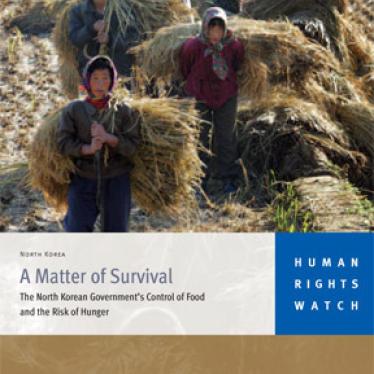(London) - Emergency food aid to North Korea should not be suspended in response to the country’s alleged nuclear test, Human Rights Watch said today. Since the mid 1990s, North Korea has been dependent on foreign aid to feed up to one third of its population.
On Monday, Pyongyang’s state-controlled Korea Central News Agency announced that North Korea had successfully conducted an underground nuclear test. South Korea’s Defense Ministry told reporters that they detected an explosion on Monday morning near Kilju, on the northeastern coast of North Korea near China.
“As the international community responds to North Korea’s nuclear test, it must distinguish between the North Korean government and ordinary citizens,” said Sophie Richardson, deputy Asia director at Human Rights Watch. “Further restraints on food aid will only make ordinary North Koreans suffer more.”
After North Korea announced its nuclear test on Monday, South Korea said it would cut off its emergency aid for the flood damage that North Korea suffered this summer as well. When North Korea test fired seven ballistic missiles on July 5, the world was quick in expressing grave concerns. Only 10 days later, the United Nations Security Council adopted a resolution condemning the launch. South Korea protested the missile launch in a high-level inter-Korea meeting in July; when North Korea refused to discuss the issue, Seoul decided to suspend its food aid.
Demographic experts believe that about 1 million North Koreans perished in the 1990s because of food shortage and hunger-related diseases. Human Rights Watch has expressed grave concerns for the North Koreans’ right to food in a recent report, “A Matter of Survival: The North Korean Government’s Control of Food and the Risk of Hunger.” A series of policy changes that North Korea adopted last year could lead to renewed hunger, the report warned.
Although it is difficult to precisely gauge conditions in North Korea, there are serious indications that another food crisis is looming. According to the World Food Programme (WFP), hundreds were killed and tens of thousands of North Koreans were left homeless in recent floods. Last year, North Korea received about 1 million tons of food aid, about half coming from each China and South Korea. North Korea has most likely run out of last year’s harvest by now, and its harvest this year suffered from massive floods. WFP estimates this year suggest that North Korea currently lacks 800,000 metric tons of grain, or approximately one-sixth of the county’s total annual food needs.
“North Korea’s nuclear weapons program can have devastating security implications in the region, but suspending food aid could be lethal for ordinary North Koreans,” said Richardson.
Some North Korea watchers oppose food aid to North Korea, citing suspicion that some of the aid is diverted to the military instead of reaching the needy. But Human Rights Watch’s research has shown that members of the military and ordinary civilians alike suffer from hunger and food shortages.
Seoul should resume food aid to North Korea, and all aid donors should use this occasion to press for proper monitoring of distribution to ensure food reaches the intended beneficiaries, those most vulnerable to malnutrition and starvation. China should not cut its food aid. The United States, Japan and other donors should resume food aid as well. If this aid has been a purely humanitarian gesture, it should not be affected by non-humanitarian reasons. All those concerned with North Koreans’ welfare should prepare to provide assistance to a potential surge in refugees.
“The welfare and possibly even survival of many ordinary North Koreans is in the hands of the international community now,” Richardson said.







